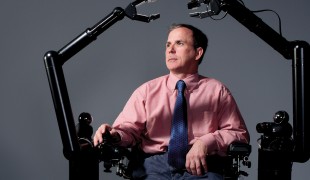- 6110
- 482
- 10
- 14
- 0
- Help Ukraine
About the solution
Paul became paralysed from the neck down after a motorcycle accident. Scott is specialised in web design and marketing, and has been in a wheelchair since he was nine because of an incomplete spinal injury.
IAT consists of a ramp and four rollers that sit underneath the wheelchair, each of which has different resistance levels that can be modified individually. The rollers also come with built-in sensors and can be connected to any cycling app to measure speed, distance and calories.
Paul first had the idea for Invictus Active when he wanted to lose weight. “I’d put a lot of weight on after my accident and realised the only way I could lose it was to exercise, but the only part of my body that now works is my arms so all I can really do is push my wheelchair”, he explained.
“So to improve my strength and general fitness, I had the idea of creating a treadmill for wheelchairs. I investigated technology in the cycling world and tailored that technology to suit the wheelchair. I built a prototype using wood in my garage and after using it for a while I could feel myself getting quicker and stronger. The great thing about the IAT is that it can be dismantled and reassembled without any tools. Each of the four rollers also operates independently – ideal for improving balance, particularly for sports like wheelchair basketball or tennis”, the inventor described
Then he met Scott, through a love of wheelchair tennis. Scott noticed that his partner was losing weight. They teamed up and Scott helped Paul bring the device to the market.
“After discussions, we realised we could benefit from each other’s professional backgrounds. Scott has great experience in marketing and SEO optimisation and I had previously made a living in engineering, so we decided to combine our fields of expertise to promote the product”, Paul noted.
Together they created their company and they ship their products worldwide. IAT can be bought online.
Adapted from: https://bit.ly/2B07E6g
https://bit.ly/2Mupaoy
More info: https://www.invictusactive.com/
https://www.youtube.com/watch?time_continue=1&v=K3g5fhjvU5c
这些解决方案不应包括使用药物,化学品或生物制品(包括食品);创伤性设备;冒犯性的,商业或内在危险的内容。该解决方案未经医学验证。请谨慎进行!如果您有任何疑问,请咨询健康专家。
DISCLAIMER: This story was written by someone who is not the author of the solution, therefore please be advised that, although it was written with the utmost respect for the innovation and the innovator, there can be some incorrect statements. If you find any errors please contact the patient Innovation team via info@patient-innovation.com
-
-
488
-
0
-
6103

Wheelchair user creates mobility app
MOVING IN A WHEELCHAIR: Moving using a wheelchair.
Paralysis
App (Including when connected with wearable)
Restoring mobility
Promoting self-management
Managing Neurological Disorders
Building Supportive Community Relationships
Promoting inclusivity and social integration
Preventing (Vaccination, Protection, Falls, Research/Mapping)
Raise awareness
Caregiving Support
Internal Medicine
Neurology
Orthopedics
Physical Medicine and Rehabilitation
Rheumatology
Belgium
-
-
-
455
-
0
-
7312

Paralyzed man designs innovative wheelchairs
CAREGIVING
MOVING IN A WHEELCHAIR: Moving using a wheelchair.
Grip
Rubgy
Basketball
Paralysis
Cervical spinal cord injury/Tetraplegia
Assistive Daily Life Device (to help ADL)
Assistive Technology access
Walking Aid (wheelchair/walker/crutches)
Restoring mobility
Replacing lost limbs
Promoting self-management
Promoting inclusivity and social integration
Recovering from Traumatic Injuries
Preventing (Vaccination, Protection, Falls, Research/Mapping)
Caregiving Support
Neurology
Orthopedics
Physical Medicine and Rehabilitation
United States
-
-
-
372
-
0
-
4775

Rowheels – Wheelchairs that saves its user’s energy
MOVING IN A WHEELCHAIR: Moving using a wheelchair.
CAREGIVING
Cervical spinal cord injury/Tetraplegia
Walking Aid (wheelchair/walker/crutches)
Restoring mobility
Managing pain
Promoting self-management
Preserving Organ Function
Preventing (Vaccination, Protection, Falls, Research/Mapping)
Neurology
Orthopedics
Physical Medicine and Rehabilitation
Rheumatology
United States
-
 zh
zh